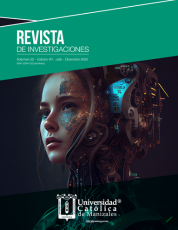Música para convivir en armonía
DOI:
https://doi.org/10.22383/ri.v22i40.195Palabras clave:
música, banda musical, habilidades sociales, convivencia pacíficaResumen
El presente documento surge como resultado del informe final de una investigación sobre “la práctica musical bandística en el desarrollo de habilidades sociales para la convivencia pacífica con estudiantes de una banda musical en el Municipio de La Dorada, Caldas-Colombia". El proceso realizado en el marco de la investigación describe la caracterización de las habilidades sociales que se desarrollan a través de la práctica musical bandística, los aportes en aspectos sociales y vivenciales que la práctica musical bandística hace a los estudiantes y los aportes a la convivencia pacífica.
Esta investigación se desarrolló bajo el enfoque mixto y el método narrativo – hermenéutico, para lo cual se recurre a la voz de los propios actores mediante entrevista de tipo semiestructuradas y abiertas para la construcción de los datos, aunados a la aplicación del instrumento escala de habilidades sociales (EHS) a 25 estudiantes que integran la banda estudiantil de música en edades de 12 a 17 años y que tiene como finalidad la evaluación de la aserción y las habilidades sociales.
El análisis de los datos permite concluir que las bandas como espacios socioformativos aportan y contribuyen al desarrollo de habilidades sociales que favorecen la convivencia pacífica, pues a través de la confrontación de los relatos y la prueba psicométrica se puede interpretar y comprender los cambios en las relaciones sociales de los estudiantes.
En este documento se desarrollará la categoría denominada “música para convivir en armonía”.
Citas
Caballo, V. (2007). Manual de evaluación y entrenamiento de las habilidades sociales (Septima ed). Siglo XXI Editores S.A.
Chaux, E. (2003). Agresión reactiva, agresión instrumental y el ciclo de la violencia. Revista de Estudios Sociales, 15, 47–58. http://journals.openedition.org/revestudsoc/25981
Chaux, E., Lleras, J. y Velásquez, A. (2004). Competencias Ciudadanas: De los estándares al aula, una propuesta de investigación a las áreas académicas. Ministerio de Educación. Universidad de los Andes.
Díaz Meza, C. (2007). Narrativas docentes y experiencias escolares significativas: relatando el sentido de ser maestro. Revista Científica Guillermo de Ockham, 5(2), 55–65. https://www.redalyc.org/pdf/1053/105316865004.pdf
Gismero González, E. (2010). Escala de habilidades sociales. Hogrefe TEA Ediciones. https://web.teaediciones.com/Ejemplos/EHS_Extracto-Manual-web.pdf
Goldstein, P., Sprafklin, R., Gershaw, N., y Klein, P. (1989). Habilidades sociales y autocontrol en la adolescencia. Martínez Roca.
Hernández, R. (2014). Metodología de la investigación. McGRAW-HILL/INTERAMERICANA EDITORES.
Jauset, J. (2018). Música y neurociencia la musicoterapia fundamentos, efectos y aplicaciones terapeuticas. Editorial UOC.
Jiménez, D. (2020). Premio a la investigación e innovación educativa experiencias 2019. En Armonías de paz. La educación musical en la promoción de competencias socio emocionales para la ciudadanía y la convivencia. Alcaldía Mayor de Bogotá, Secretaría de Educación del Distrito.
Kelly, J. (2002). Entrenamiento de las habilidades sociales. Desclée de Brouwer.
Martínez Pacheco, A. (2016). La violencia. Conceptualización y elementos para su estudio. Política y Cultura, 46, 7–31. https://www.scielo.org.mx/pdf/polcul/n46/0188-7742-polcul-46-00007.pdf
Mockus, A. (2002). Convivencia como armonización de ley, moral y cultura. Perspectivas: revista trimestral de educación comparada, XXXII(1), 19–37. https://unesdoc.unesco.org/ark:/48223/pf0000132812_spa
Monjas Casares, M., y González Moreno, B. (2000). Las habilidades sociales en el currículo. Ministerio de Educación, Cultura y Deporte. https://sede.educacion.gob.es/publiventa/PdfServlet?pdf=VP08661.pdf&area=E
Organización Mundial de la salud [OMS]. (2002). Informe mundial sobre la violencia y la salud, 1–11.
Ríos Saavedra, T. (2013). La hermenéutica reflexiva en la investigación educacional y social. Universidad de Manizales.
Sanmartín Esplugues, J. (2007). ¿Qué es violencia? una aproximación al concepto y a la clasificación de la violencia. Daimon Revista Internacional de Filosofia, 42, 9–21. https://revistas.um.es/daimon/article/view/95881
Schunk, D. (2012). Teorías del aprendizaje, una perspectiva educativa. Pearson Educación.
Touriñán López, J. M. (2012). Desarrollo cívico, sentido intercultural de la educación y convivencia cualificada y especificada. https://www.researchgate.net/publication/292159181_Desarrollo_civico_sentido_intercultural_de_la_educacion_y_convivencia_cualificada_y_especificada
Vaillancourt, G. (2009). Música y musicoterapia, su importancia en el desarrollo infantil. Narcea, S. A. de ediciones.
Descargas
Publicado
Cómo citar
Número
Sección
Licencia
Derechos de autor 2022 Revista de Investigaciones · UCM

Esta obra está bajo una licencia internacional Creative Commons Atribución-NoComercial 4.0.
Atribución – no comercial: esta licencia permite a otros distribuir, remezclar, retocar, y crear a partir de tu obra de manera no comercial y, a pesar de que sus nuevas obras deben siempre mencionarte y mantenerse sin fines comerciales, no están obligados a licenciar sus obras derivadas bajo las mismas condiciones.











